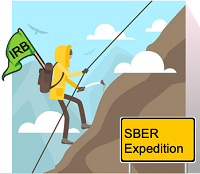On March 30, 2021, PRIM&R hosted the webinar “Ominum-Gatherum: An SBER Variety Show.” During this webinar, Tonya Ferraro, MEd, and Andrew Hedrick, MPA, CIP, focused on three social, behavioral, and educational research (SBER) topics: Terms of Service agreements, randomized controlled trials in the social sciences, and research involving deception.
Following the webinar, the presenters reflected on the session and prepared an SBER guidance document; we’re pleased to share this resource with the readers of Ampersand.
Due to the diverse methodologies, interdisciplinary nature, and broad implications of SBER, IRBs who review SBER are presented with unique challenges. In our webinar, we addressed Terms of Service agreements, deception, and randomized controlled trials (RCTs) in the social sciences. We provided a high-level summary, discussed the challenges, and shared tips on how to navigate the review process.
After receiving feedback from attendees, we were inspired to compile our materials into an accompanying reference, “The Ominum-Gatherum: An SBER Variety Show Guidance Document,” which includes definitions, challenges, review considerations, and tips. (You can download this guidance document by logging into the Knowledge Center; if you don’t already have a PRIM&R account—it’s the same one you use to register for programs and renew PRIM&R membership—you can create one for free.)
When adventuring on an SBER expedition, we are reminded to ask, “What tools do we have in our IRB reviewer packs?” The webinar and accompanying guidance document serve as a reminder of how, in the face of the unique challenges posed by SBER, IRBs can be adaptive, creative, and communicative in their approaches and considerations.
The guidance document covers:
Terms of Service
- What is the definition of Terms of Service?
- Why should IRBs care about the privacy paradox?
- Three ToS Examples: Challenges & Considerations
Deception
- Are deception and incomplete disclosure the same?
- Can deception research qualify as exempt?
- What are some considerations when reviewing research that involves deception?
Randomized controlled trials in the social sciences
- What is the definition of a Randomized Controlled Trial?
- What is the purpose of an RCT?
- What does an RCT look like? A Basic Design
- Where have we seen RCTs in SBER?
A legal RCT Case Study: The A2J Lab
- What are some of the IRB challenges of reviewing RCTs in SBER?
- IRB Review Challenges: Equipoise, Lack of Precedent, and Field Wilderness
- What “tools” do IRBs have in their review pack?
Below are references and further reading that influenced the webinar:
Terms of Service
- Name Drop Study: Study on Privacy Policies and Terms of Service Agreements
- SACHRP Digital Health Technologies Guidance
Deception
- Reading the Ethics Code more deeply (American Psychological Association)
RCTs in the Social Sciences
PRIM&R thanks Tonya Ferraro and Andrew Hedrick for sharing their expertise and for creating and sharing the above guidance document. The recording of this webinar is available for purchase in the Knowledge Center. You can download The Ominum-Gatherum: An SBER Variety Show Guidance Document at no cost by logging into the Knowledge Center—if you don’t already have a PRIM&R account (it’s the same one you use to register for programs and renew PRIM&R membership) you can create one for free.
Tonya Ferraro, MEd, is the Senior IRB QI Consultant of the Education and Quality Improvement Program (EQuIP) at Boston Children’s Hospital (BCH). Her responsibilities include educational outreach, new/transfer PI trainings, study reviews/audits, and assisting in BCH’s reaccreditation effort. She is a member of Harvard Catalyst’s subcommittees: Emerging Technologies, Ethics, and Research and QA/QI, and also serves on PRIM&R’s Diversity Advisory Group. Tonya was also a member of the 2019 and 2021 SBER Planning Committees.
Andrew Hedrick, MPA, CIP, is a Senior IRB Protocol Analyst in the Office of Responsible Research Practices at The Ohio State University (OSU). He helps manage the Behavioral and Social Sciences IRB and one of the cancer IRBs at OSU. Before moving to OSU in June of 2019, he spent nearly eight years managing the social/behavioral (non-medical) IRB at the University of Kentucky (UK). Andrew was a member of the 2019 SBER planning committee, a member of the 2020 AER planning committee, and was co-chair of the 2021 SBER planning committee.


No comments! Be the first commenter?